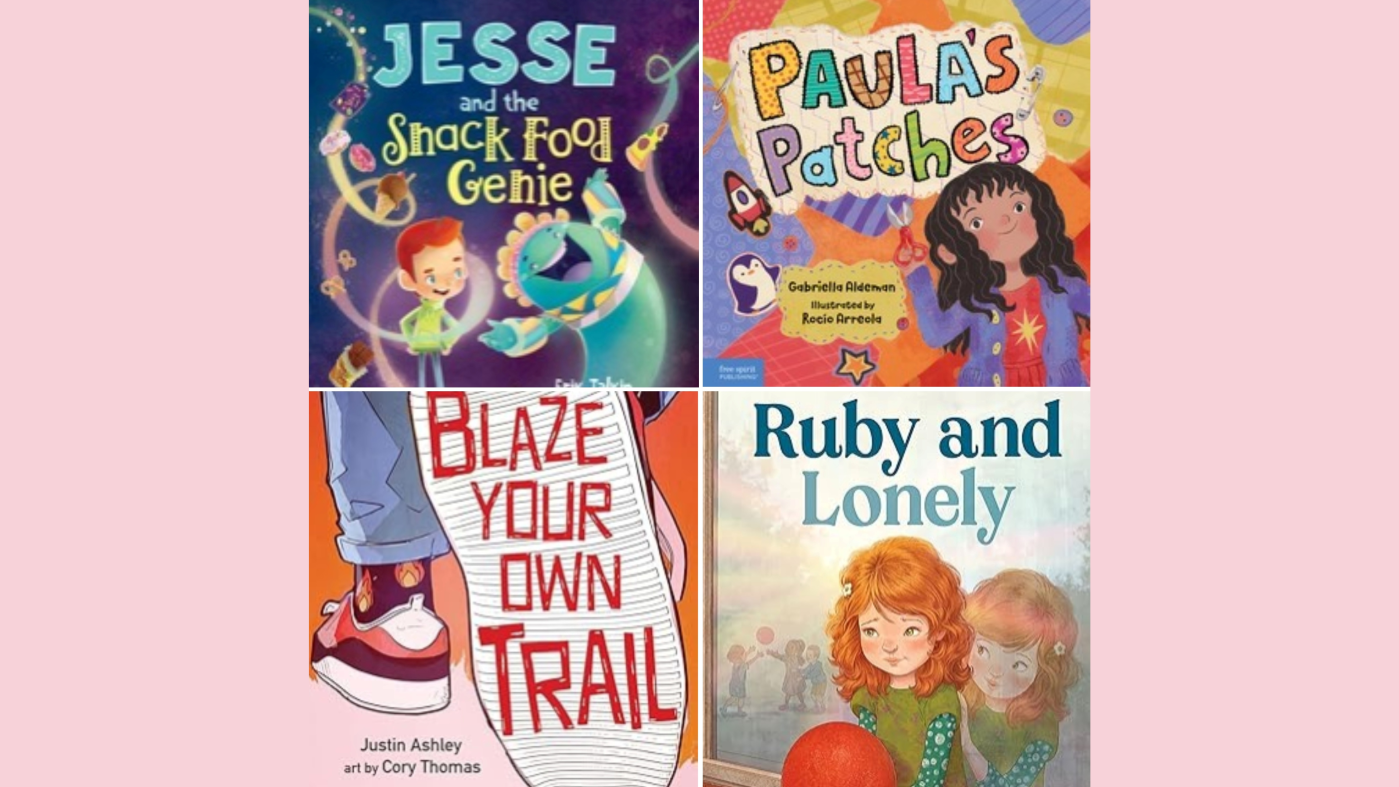
Readers and writers: Childhood can be tough. These books can help.
Childhood can be scary sometimes as youngsters struggle to make sense of their emotions. Thanks to Minneapolis-based Free Spirit Press Publishing, there are lots of good books by knowledgeable people to help kids navigate their feelings and learn about their relationship to the world around them. Free Spirit is an imprint of Teacher Created Materials, publisher of learning tools that support young people’s social, emotional and educational needs. Its mission is to help children and teens think for themselves, overcome challenges and make a difference in the world through illustrated picture books for the little ones. Most of the hardcover Free Spirit books referenced here are $17.99.
“Frankie Versus the Food Phantom”: by Erik Talkin, illustrated by Laura Ramos; and “Jesse and the Snack Food Genie”: by Erik Talkinn, illustrated by Maine Diaz.
(Courtesy of Free Spirit Publishing.)
These books are part of Free Spirit’s Food Justice Books for Kids, a series devoted to having enough fresh, healthy, affordable food, including locally grown food that is right for the little reader’s culture. In the first book, Frankie is learning about how people in low-income neighborhoods have to pay more for their food, and the influence of big food companies. The kids are shown how to grow their own food but the Food Phantom taunts them by telling them they will never understand this complicated business. In the end, the Phantom has a change of heart. In the second book, Jesse is pressured by the Snack Food Genie to eat expensive snacks like potato chips. The Genie suggests a Snackover where the kids can fill up on junk food. The next day the narrator is “tired and grumpy.” When the kids are introduced to fruit and vegetable snacks they start to enjoy them and realize they feel much better with healthy food.
“Sometimes When I’m Worried”: by Deborah Serani, illustrated by Kyra Teis.
Serani, who is a psychologist, tells of a girl’s emotions when she is worried — doesn’t want to go to school, feels like her worries will never end, feels scared, can’t calm down, tummy feels funny, can’t sleep. Dad suggests she do some belly breathing and make herself go to an event that she’ll end up enjoying as well as concentrating on all the things she likes about school, her friends, and happy things she will do the next day. So many youngsters worry these days, so this would be a valuable holiday gift since the message is disguised in the attractive pictures and the relatability of the young girl.
“I Think I Think a Lot”: by Jessica Whipple, illustrated by Josee Bisaillon.
Inspired by the author’s experience with obsessive-compulsive disorder, the main character notices and wonders about the different ways she and her classmates approach doing good work, and comes to accept herself just as she is. The story helps readers increase empathy through understanding and acceptance. This is a special book for those with anxiety, ADHD, autism, and giftedness and perfectionism tendencies.
“Dear Dad; Love, Nelson”: by Margarett McBride, ilustrated by David Wilkerson.
It isn’t easy for a child whose parent is in prison, so telling one boy’s story is a good way to approach this separation. Nelson writes letters to his father sharing his feelings, thoughts, wishes and happenings, from family celebrations to the car he and Dad were fixing and how excited he is to have Dad come home. More than 5 million children in the U.S. have experienced a parent’s incarceration, and a section at the back of the book offers tips for children on writing to loved ones in prison and discussion questions as well as additional resources.
“Paula’s Patches”: by Gabriella Aldeman, illustrated by Rocio Arreola Mendoza.
An embarrassing incident can seem like the end of the world to a kid, especially if it happens in school. When Paula’s pants tear at school, her mother patches the rip. Other kids tell their stories of mended clothes and pretty soon patches are the big thing in Paula’s classroom as she makes new friends. Tips for mending and making things such as lunch bags are in the back of the book.
(Courtesy of Free Spirit Publishing)
“Blaze Your Own Trail”: by Justin Ashley, art by Cory Thomas.
This 175-page paperback, subtitled “Ideas for Teens to Find and Pursue Your Purpose,” is packed with all the help a teen needs to navigate those sometimes-hard years. In the introduction, the author, an award-winning teacher, work-life-balance coach and motivational speaker, admits he was a “weird kid.” With humor and kindness, he explores things in this book from three viewpoints — the inner path (about interpretation), the outer path (about connection) and the outward path (about determination). Chapters include creating a vision board to test the universe of dreams, how to survive the Zombie Student Apocalypse, learning to accept what you learn at the Feedback Diner, creating your happy place, freeing yourself from self-doubt and holding a conversation with anxiety. Teen years are hard and adults who read this book will probably wish they had it when they were that age.
“Ruby and Lonely”: by Patrice Karst, illustrated by Kayla Harren (Two Lions, $17.99).
(Courtesy of Two Lions)
Ruby doesn’t understand why she feels bad. Her older siblings are doing things, her parents work, even her dog spends happy time barking at squirrels. When her teacher suggests that if you have a problem you should give it a name, Ruby calls hers Lonely. Ruby reaches out to her parents and siblings to do fun things and Ruby and Lonely have so much fun that even the dog, Lola, notices a difference in Ruby. In the end, Ruby realizes Lonely is part of her and she is part of Lonely. And she can lead a happy life. Minnesotan Kayla Harren’s illustrations are endearing and filled with energy. Hearst is the author of “The Invisible String” series about the unbreakable connection between loved ones despite distance and loss. “Ruby and Lonely” is the perfect book for a kid who feels left out.
“Too Many Hugs”: by Yvonne Pearson, illustrated by Maria Burobkina.
Subtitled “A Book About Consent,” this book by a Minneapolis author focuses on Theo, who is tired of hugs. Grandma insists on hugs, his sisters hug too tightly. He just wants to go into a blanket cave. NO MORE HUGS. So he hangs his rules on the refrigerator and everyone knows to ask permission if they want to hug him.
Related Articles
‘Trauma Sponges’ author Jeremy Norton to speak on panel about life as EMT/firefighter
Readers and writers: A trip ‘Up North’ for two great books
How a book publishing ‘mistake’ reignited the U.K.’s royal racism furor
Readers and writers: How Barbara Kingsolver’s daughter got her to team up to write first children’s book
Literary calendar for weeks of Nov. 19 and Nov. 26


